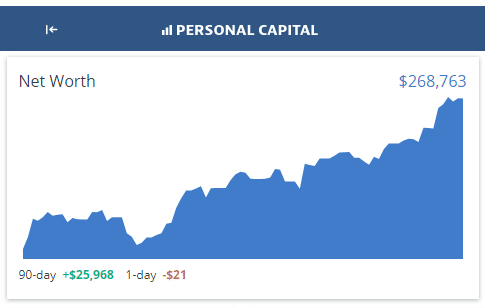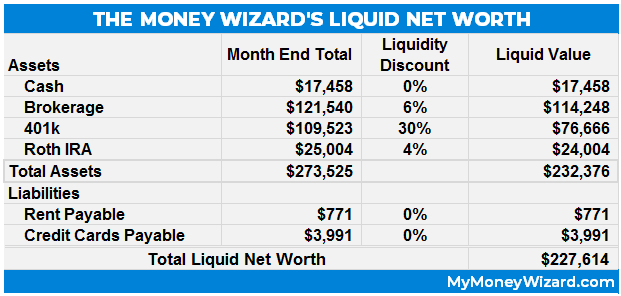

In the world of personal finance, liquid net worth is like the underappreciated, red-headed step child.
While regular net worth aced every every class in school, graduated with honors, and went on to make his parents proud as a doctor or lawyer, liquid net worth is mostly forgotten.
Which is a huge mistake.
Because while Net Worth tends to get all the credit, Liquid Net Worth might actually be a more important measure when it comes to:
- Evaluating your financial security
- Escaping the rat race
- And ultimately, enjoying financial freedom for decades
So, what is liquid net worth? How do you calculate your liquid net worth? And maybe most importantly, what does it all actually mean?
Good news, we’re devoting the next 7 minutes towards re-framing our thoughts about about net worth. By doing so, we’ll hopefully get a more accurate view of our money, which will allow us to crush the path towards financial freedom.
How to calculate your net worth
Before we dive into liquid net worth, we’ll start our lesson with a quick review. I know, I know… hold your groans!
Net Worth = Assets – Liabilities
So, the process is simple. Tally up all your assets, subtract any debt that you owe, and voila! You’ve got the world’s preferred benchmark for financial evaluation.
At the most basic level, your assets include anything with value. This sounds like a vague definition, and it is. As a result, most net worth calculations include the following assets:
- Your cash
- Stocks, bonds, and any other investments
- Retirement accounts
- Value of your home
- Value of your car
- In some cases, valuable jewelry, art, collectibles, etc.
I find those last two bullets to be a liiiiittle generous, and too often, they’re used as an excuse to blow cash. So, I personally exclude them in my net worth calculation.
On the liabilities side, we’re looking at these common culprits:
- Student loans
- Total amount left on your mortgage
- Credit card balances
- Any miscellaneous loans you owe the payday lenders, the mob, or those illegal loan sharks.
(Hopefully none of our readers have to worry about that last bit!)
When I tally up the number I use in my net worth updates, we’re simply looking at the difference between these two categories.
You might have already noticed the issue here. Net worth acts as a nice, quick guide. But when it comes to the boots-on-the-ground, day to day finances, a big fat net worth doesn’t actually help us all that much.
Okay, so what is liquid net worth?
Imagine fire starts raining down from the sky. The horror!
We’re in emergency mode. A big house or fancy car won’t save us now, because we need cash ASAP.
To address this blind spot in the typical net worth calculation, finance geeks created what’s called a liquid net worth.
The goal? Find out how much easily accessible money you actually have.
Liquid Net Worth Definition

Therefore, the most common definition you’ll see for liquid net worth is:
Liquid Net Worth = the portion of your net worth held in cash or that is easily converted to cash.
Most sources will translate this to simply mean your cash plus your “close-enough to cash” items, like stocks and bonds. They’ll completely chop off any value of your home and retirement accounts, and call it a day.
This is a total oversimplification, and we can do better. So, let’s run through a few common balance sheet items.
Is a house a liquid asset?
The textbook answer is no.
But, that’s not to say your house is worthless either. We all know a $250,000 home is worth, well… about $250,000. When calculating your liquid net worth, the question becomes how realistic is that $250,000-ish asset?
Three things to consider:
- Depending on the real estate market you’re in, completing the sale of a house could take anywhere from a few weeks to a few months.
- Real estate sales also come with some notable costs, most notably the typical 6% fee paid to your realtor.
- In the haggle-first world of real estate, there’s also no guarantee you’ll get your full asking price once the negotiations finish.
For all these reasons, I recommend applying a percentage discount to the value of your home when calculating your liquid net worth.
Anywhere from a 15-20% discount would be reasonable to account for the length of sale and typical costs.
Is a 401k a liquid asset?
Again, the textbook answer is no. For the following reasons:
- Technically, withdrawing 401k or other retirement funds prior to age 59.5 will incur a 10% penalty.
- If you have a Traditional 401k, you’ll also owe taxes. (At your marginal tax rate – 22-24% for most wage earners)
And again, that “no” answer is somewhat misleading.
Your 401k has a real value. And in a true liquidity pinch, you could get the money. Plus, with a bit of planning, savvy money wizards reaching early retirement can use a Roth IRA Conversion ladder to avoid the 10% penalty and limit their taxes owed.
Nonetheless, we’ll stay conservative and apply a 30% discount to our 401k balances.
Is a Roth IRA a liquid asset?
Another textbook no. Followed by my, “well… sort of!” response.
Remember, we can always hack our Roth IRAsby withdrawing the contributions tax free!
BUT, withdrawing any investment gains prior to age 59.5 would mean we’d owe:
- 10% early withdrawal penalties
- Taxes on the gains at your marginal tax rate.
At the time of this writing, my Roth IRA is worth $25,000, of which $22,000 are my own contributions.
Doing the math, I’d pay:
- 10% early withdrawal penalty on the gains = $300
- Taxes on the gains at my marginal tax rate = $720
Total cost? $1,020 or 4% of the account balance.
Someone with a larger portion of gains would want to adjust this discount value accordingly.
Are stocks and bonds liquid assets?
Yes, they are. I could sell all the stocks and bonds in my brokerage accounts and have money in my hand within 3 business days.
The only catch is that the gains on the sale are subject to taxes. But if you’ve held the stocks for over a year, you qualify for a reduced tax rate of 15%, known as the “long term capital gains” tax.
(Read that again. 15% of your gains – not the total value of your brokerage account.)
For example, my brokerage account is currently worth $122,000, of which $46,000 are investment gains.
If I sold everything today, I’d pay a 15% long term capital gains tax on $46,000. The $6,900 bill I’d owe Uncle Sam represents 5.6% of the total account value.
Obviously, how much you should discount your brokerage account depends on how much gains you have in your portfolio. As a rule of thumb though, discounting your brokerage portfolio by 5-10% is a reasonably conservative amount.
How to calculate your liquid net worth
To calculate a final liquid net worth number, let’s use a real example. Me!
As of my latest net worth update, I have a “normal” net worth of $268,763.

Running through the adjustments calculates my liquid net worth at… (drumroll please…)
What is my liquid net worth?

$227,614!
In my case, calculating my liquid net worth dropped my wealth by $45,911, or 19%.
Ouch!
But let’s get to the silver lining.
(Quick note – unfortunately we don’t have the house curveball to add to the example. If we did, I’d take the current Zillow Zestimate, Redfin Value, or county tax assessment and subtract 20%.)
Final Thoughts – What does liquid net worth really mean?
 Sure, it’s never fun to make yourself poorer, but finding your liquid net worth is an interesting exercise nonetheless.
Sure, it’s never fun to make yourself poorer, but finding your liquid net worth is an interesting exercise nonetheless.
I’m aiming for total financial freedom. For me, this means building up enough assets to support my lifestyle, without having to ever work for anyone ever again.
And this is how I like to use liquid net worth. When we calculate how much our wealth is worth today, we learn something that’s critical for being able to walk away from work forever:
Liquid Net Worth / Your Annual Spending = Years of Freedom
In my case, I’ve built a liquid net worth of $227,000 so far, while my annual spending is around $25,000 per year. That means I’ve already built over 9 years of complete freedom.
I love knowing that if something happened, I’ve already put myself in a spot to be a-okay for nearly a decade. Or that if I really wanted to, I could take a 9 year unpaid sabbatical from the working world entirely – traveling the world, working on passion projects, or spending time with family.
But is that all?
Nope – this simplified estimate doesn’t consider the ongoing compounding effects of that $227,000.
Imagine I quit work tomorrow, and withdraw my $25,000 of annual expenses. The remaining $202,000 will continue to compound. At a 7% rate of return, that lump sum should return over $14,000 per year.
That’s over half of my living expenses.
And that number will continue to grow as I save more and more money. Until one day, the returns from my net worth will support almost my entire lifestyle, and the runway built from my liquid net worth is long enough to provide more years of safety than I’ll ever need.
At which point, we’re free to leave all the concerns of the working world behind.
We’re free to take off down that runway. And we’re ready to soar.
PS – If you want to easily track your net worth and calculate your own liquid net worth, Personal Capital is my favorite net worth tracking tool.


This is a great exercise to perform, it truly shows your progress to financial freedom. I think far too often people inflate their net worth statements with cars and houses; all of which, as mentioned in this post don’t do much for you in a time of emergency.
I track my liquid assets to non-liquid assets and ensure I am around the 50:50 marker. Also, I run my net worth through a liquidation scenario whereby I convert everything to cash regardless of penalty and fees. I like to see how much I will have left and how long that would last me.
Great post. Liquidity is the key to financial independence.
Thanks!
Good topic choice for a blog post. Few people think about liquidity.
About 67% of my net worth is liquid, which is OK. I wish it was a little higher. 75% might be about right.
Thanks Mr. Tako!
My ratio would definitely drop with more equity in real estate. 75% does seem like a reasonable target for somebody who’s already retired.
My liquid net worth is a little less than half of my ~200k net worth, most of my assets are in retirement
accounts. ‘m really jealous of the long term capital gains rate you pay in the US. In Canada it is 50% of your marginal tax rate which for me is between 20-25%. The US really is a better place to build wealth than Canada.
I’ve said it before – when it comes to the freedom to design an early retirement, there’s no place in the world I’d rather be. US citizens have an amazing opportunity, and that’s a message I’m hoping this site will spread.
@DanP – the USA is better for building wealth UNLESS you run into major health problems. Then who knows…
That’s fair. I actually just had a full radial head replacement operation and it only cost me 350 bucks.
For what it’s worth, I think even that concern is overblown sometimes. Our system is far from perfect, but it does have some good things going for it. Namely out of pocket maximums and how much insurance we can buy when we’re paying $10,000 less in taxes each year.
Sorry if this is an obvious question, but I’m new at this whole thing, and I was wondering, how is your money coming back at 7%? From what I’ve seen, the highest return rate is like, 2%. I would love it if you could let me know! Thank you! 🙂
It sounds like you’re limiting your search to savings accounts or money market funds. The stock market returns an average of 7% of the long run, although it can be a much rockier ride along the way. You’ll probably enjoy this article:
https://mymoneywizard.com/3-fund-portfolio/
With how economy is on a macro scale:
Wage stagnation (when people don’t have enough discretionary income, they aren’t spending it at big box stores so many people invest in)
Rate cuts (over stimulation to borrow in a market that is already running on fumes)
Trade tariffs
Shrinking semiconductor markets
Junk and Foreign Debt
Massively overvalued companies
Insane QE
Housing market slowing due to exorbitantly high prices
Student Loans
etc etc… it is highly unlikely that ETF’s and other mutual fund assets will ever consistently return 7% per year average ever again. The fact that we are at the same levels in our indices as we were 18 months ago, with two major corrections should be an indicator of the future.
What you said previously USED to hold true, there is an investor class and a working class.
Now, even the investor class is facing the shortcomings of our monetary and commerce policies. I think, moving forward, the only way to be wealthy is to, well, be wealthy. Either through inheritance or accumulating vast sums of money through lucky one-off business, hedge funds etc. Long term investing may now well be a thing of the past, even the big players make their money on the bid-ask spread, and not long term investments. Warren Buffett may have made money playing the long term, sure, but his long term is near the end of his term, and he started investing in a time when policies allowed massive growth.
If we wish to save and amass wealth for our futures, we will need to come up with options other than stocks, bonds.
This article you wrote has several flaws in it: https://mymoneywizard.com/3-things-you-should-never-do-when-stocks-tanking/
for one, there was no way of knowing that you would have made those said 145% by holding, it could have seriously gone either way (at the time). more than holding and doubling down, it can be equally if not more important to cut your losses early, and let your winners run. Winners tend to keep winning and losers tend to keep losing, only on a macro scale do these two forces cause regression toward a mean.
These “tops”: https://i0.wp.com/mymoneywizard.com/wp-content/uploads/2018/11/this-is-the-top.jpg?ssl=1
Very much are local maxima for several reasons. One is that, no one is looking 116 years in the future for their investments, maybe a decade or two. Since the great depression, things did not recover for… another 26 years. How much changed in that time? Investments and business are not just driven forward by innovation and sales. The Macro economy is largely driven by economic and foreign policy. This crash didn’t resole itself and continue climbing just because capitalism and markets did it’s thing, a huge factor were the events of WWII.
Same with 68-88, as well as 2008. The recovery from 2008 was not because of the natural growth of markets and investing, it was due to stimulation, bailouts, etc. Of which the effects we are still dealing with (a la wage stagnation and selling our debt) it’s all trade offs. Keep in mind that mortgage rates through the 70’s and 80’s were in the 20’s and high teens! Decades of these gouging lending practices are what propped up the housing market until 2008. Now you will be hard pressed to be able to find lending rates higher than 4.25%. My point is, these “tops” very much are tops, until we trade something else, beyond the growth and return of the market, to keep stimulating. If fed rates continue to be cut, it may stimulate the stock market in the short term sure, but it is a longer term indicator of the market being weak, overvalued, and in need of stimulation.
I don’t disagree that there’s concerning facts in our economy. I talk about just one of my concerns in this article. The Disturbing Truth About the World’s Economies
But “this time it’s different” thinking has been used as convincing support for not investing in the stock market for hundreds of years. And despite two world wars, mass soup kitchen lines during the great depression, fear over potentially permanent oil embargoes in the 70s, unexplained unemployment in the 80s, potential nuclear Armageddon, etc… American business has continued to deliver profits to shareholders.
I’ll probably post about this more later.
There is also a little-known rule that will allow you to take your money out of your 401(k) as early as age 55 (or age 50 for public safety employees) without penalty. The rule is known as the “Separation from Service” rule. Here is a link to the IRS page (it is listed near the bottom of the page):
https://www.irs.gov/retirement-plans/plan-participant-employee/retirement-topics-tax-on-early-distributions
Liquid net worth sounds just as important as normal net worth in my opinion. I’m partial to red-headed stepchildren by the way 😉
It is crucial to have a certain percentage of your net worth easily accessible in a time of need or opportunity. For example, if I had 50k laying around I probably would’ve invested in the market recently when it dropped 6%.
Having a $1 million net worth but being unable to access it for weeks or months if wanted is playing with fire in the bad way.
It all depends on your Strategy. I am extremely content pulling 5-6% in a safe manor from my assets. Meanwhile I completely ignore the roller coaster rides and potentially 1-2% higher average long term gains on the stock market. I do not participate in gambling full stop.
At this moment in time. I personally wouldn’t want any net worth in paper assets or liquid assets besides two year’s worth of living expenses (my emergency fund).
The value of the house is open to many valuation methods. If you sell your house, you will have to account for post-sales living expenses. Either you will incur rental costs or buy a cheaper house and pocket the difference. I don’t recall how long that takes but it’s on the order of 60 days to clear escrow. You could also get a HELOC or 2nd mortgage but then you are paying interest to access your own capital.
The other thing people forget is that if you truly “buy & hold” the longer you hold, the larger your expected tax bill. Counter weighing that is if you hold until you after you are retired, you can pull some of that capital gain out at a lower tax bracket.
One other thing to remember is that sometimes when you move large amounts into a checking account, the bank puts a hold on some or all of it.
You can also run scenarios around how liquid you need to be. If you really need cash-in-hand in one week, a house has zero value. An exercise I do is to plan the sequencing of the assets sales. For example, I could get $100K in cash in 3 days with minimal to zero taxes and another $800K in 3 days with $100K in taxes. Then I could tap my 401k but I’ve never really explored the tax implications of selling the house, pulling from my 401k or Roth IRA. In 3 or 4 days I could have $800K in cash. Exactly what is the emergency where I would need that much cash in 3 or 4 days? Ransom from a kidnapping?
A more common exercise for me is to imagine I am laid off tomorrow without a severance package. Assuming I don’t go back to work how do I piece together my a) my next month’s living expenses, b) my next year’s living expenses and c) indefinite living expenses. I consider a) to be my emergency funds, b) to be my emergency funds plus some assets sales and c) to be my early retirement plan.
AHHH, this takes me back to good ol’ Financial Accounting class days.
I am very naturally drawn to tables and numbers.
There’s a funny episode in Modern Family when the youngest son, Luke, freezes his dough, because he heard something about wall street guys not being liquid. I lol’d at that moment.
Keep up the great progress! Steady wins the race!
But it’s much funner to try and imagine you have so much more money than you technically do! Haha. Thanks for this article, its important to remember to conversion costs and subliminal – but very real – taxes associated with investments and assets.
It is a nice concept, liquid net worth! I wonder if valuing stocks at their current price is really conservative enough? Perhaps valuing them at 50%, plus any taxes selling would cause, is more realistic since bear markets have cut stock values in half several things in the past? That would give you a worst case outlook.
I’m only taking my liquid net worth into account in my FIRE plans. I figure that I have to have a place to live, so my house valuation isn’t a valid inclusion into my calculations. If Old Lady Frogdancer gets too rickety, the sale of the house will put her into a luxurious nursing home.
Good post!
The part that I am stuck on is the $25,000 a year in living expenses. I forgot how much cheaper life is in the middle of the country. I live in the NYC suburbs, and well, everything is not cheap here.I spent 4 years living in Ohio after college, but returned to NY 16 years ago. My son’s daycare costs about $1600 a month, and that is not one of the high priced ones in my area. All of this is why we plan on retiring to one of the lower cost areas of the country as my parents did; as everyone in NY does. I should add that outside of commuting range to NY counts as a low cost area. It’s shocking how much cheaper NY is once you travel north of the commuter rail lines.
Hi there,
Just wondering what you mean by Brokerage in your Money Wizzards Liquid Net Worth table, are you referring to the brokers Fee or the total amount your stocks / shares are worth? (I’m Australian so some American terms are not my forte)
thanks
The total amount the stocks are worth. If anyone is paying six figures in brokerage fees they need to run for the hills!